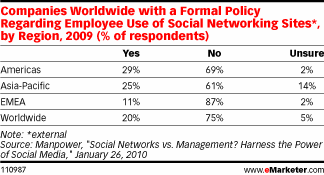
It is important for every company to have a social media policy in place. Depending on the size of your company or organization, your policy may be more or less detailed.
It is amazing to think that only 1 in every 3 companies has a social media policy in place. Of course as social media becomes a main-stream marketing tactic, more and more businesses with start to see the importance of having a writing social media policy.
Overall Philosophy and Goals
It should be clear to all employees of your organization as to why your company is implementing a social media policy. It should contain messaging and an overall philosophy that is consistent with your organization culture and other policies.
Encourage Social Media Best Practices
Employees within your organization will all have different levels of experience with social media. That is why it will be important for your employees to be trained on the best practices of monitoring and engaging in social media.
For each social media platform, it is encouraged to offer tips and examples of how people engage.
Be Honest and Transparent
Do not pretend to be someone you are not. Use your real name, job title, and experiences when interacting with people. People are becoming more savvy online and can tell if you are full of crap or telling the truth. So be transparent and always tell the truth. Also, it helps when you discuss topics that you are knowledgeable, making social media fun!
Use Common Sense and Good Judgment
I know it may be dumb to say this, but using good judgment and common sense is probably the best advice you can give your employees. If you think what you are doing may be against company policies or could have a negative impact, you probably want to stop.
Confidential and Proprietary Information
It will be important to disclose company information that is proprietary and should not become public. Typically industry secrets, proposals/contracts, internal processes, client lists, website statistics, and revenue figures are all things that most companies want to keep confidential.
Engagement During Work Hours
Face it, unless you have specific websites blocked or install tracking software on employees computers, they are going to spend time playing around on the web. So you will want to have guidelines and/or limitations as to the type of websites that are work appropriate. In my personal opinion if someone wants to check their Facebook account during lunch or even get their personal email 2-3 times a day, that should be ok. As long as you are not effecting your work or substituting work time for personal tasks.
Online Identity
Many employees will have personal blogs and websites that they maintain on their personal time. It will be important to identify the different between a personal identity and corporate identity. For example, if someone maintains a blog that discusses controversial topics, you would not necessarily what your employee to leave his business contact information. This could be tied back to the company and create a potential area of concern.
Show Examples
One of the best ways to preach great social media, it to show examples of good and bad uses of social media.






